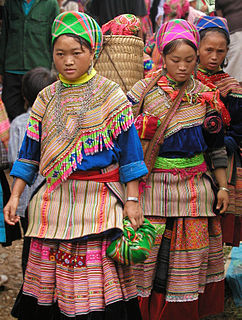
Laos, officially the Lao People's Democratic Republic, commonly referred to by its colloquial name of Muang Lao, is a socialist state and the only landlocked country in Southeast Asia. Located at the heart of the Indochinese peninsula, Laos is bordered by Myanmar (Burma) and China to the northwest, Vietnam to the east, Cambodia to the southwest, and Thailand to the west and southwest.

The Hmong people are an ethnic group in East and Southeast Asia. They are a sub-group of the Miao people, and live mainly in Southern China, Vietnam and Laos. Some Hmong have emigrated to the United States.

Laozi, also rendered as Lao Tzu and Lao-Tze, was an ancient Chinese philosopher and writer. He is the reputed author of the Tao Te Ching, the founder of philosophical Taoism, and a deity in religious Taoism and traditional Chinese religions.

Shu Qingchun, courtesy name Sheyu, best known by his pen name Lao She, was a Chinese novelist and dramatist. He was one of the most significant figures of 20th-century Chinese literature, and best known for his novel Rickshaw Boy and the play Teahouse (茶館). He was of Manchu ethnicity, and his works are known especially for their vivid use of the Beijing dialect.

Lao, sometimes referred to as Laotian, is a Kra–Dai language and the language of the ethnic Lao people. It is spoken in Laos, where it is the official language, as well as northeast Thailand, where it is usually referred to as Isan. Lao serves as a lingua franca among all citizens of Laos, who speak approximately 90 other languages, many of which are unrelated to Lao. Modern Lao (language) is heavily influenced by the Thai language. A vast number of technical terms as well as common usage are adopted directly from Thai.
Isan or Northeastern Thai is a group of Lao varieties spoken in the northern two-thirds of Isan in northeastern Thailand, as well as in adjacent portions of northern and eastern Thailand. It is the native language of the Isan people, spoken by 20 million or so people in Thailand, a third of the population of Thailand and 80 percent of all Lao speakers. The language remains the primary language in 88 percent of households in Isan. It is commonly used as a second, third, or fourth language by the region's other linguistic minorities, such as Northern Khmer, Khorat Thai, Kuy, Nyah Kur, and other Tai or Austronesian-speaking peoples. The Isan language has unofficial status in Thailand and can be differentiated as a whole from the Lao language of Laos by the increasing use of Thai grammar, vocabulary, and neologisms. Code-switching is common, depending on the context or situation. Adoption of Thai neologisms has also further differentiated Isan from standard Lao.
Lao script or Akson Lao is the primary script used to write the Lao language and other minority languages in Laos. It was also used to write the Isan language, but was replaced by the Thai script. It has 27 consonants, 7 consonantal ligatures, 33 vowels, and 4 tone marks.

The kip is the currency of Laos since 1952. Historically, one kip was divided into 100 att (ອັດ).

Xiu Xiu: The Sent Down Girl is a 1998 Chinese film directed by actress Joan Chen set in the 1970s of the People's Republic of China, during the Cultural Revolution's Down to the Countryside Movement. This drama film is Chen's directorial debut. The film stars Li Xiaolu and Lopsang.

The French protectorate of Laos was a French protectorate forming part of the French Colonial Empire in Southeast Asia. It consisted of much of the territory of the former kingdom of Lan Xang and was part of French Indochina from 1863 until it was granted self-rule within the French Union in 1946. The Franco-Lao Treaty of 1953 establishing Laos as an independent member of the French Union. Under the Geneva Conference following France's withdrawal from Indochina after the First Indochina War, Laos was granted independence in 1954.

Rickshaw Boy or Camel Xiangzi is a novel by the Chinese author Lao She about the life of a fictional Beijing rickshaw man. It is considered a classic of 20th-century Chinese literature.

Vientiane is the capital and largest city of Laos, on the banks of the Mekong River near the border with Thailand. Vientiane became the capital in 1563 due to fears of a Burmese invasion but was later looted then razed to the ground in 1827 by the Siamese (Thai). Vientiane was the administrative capital during French rule and, due to economic growth in recent times, is now the economic center of Laos. The city had a population of 820,000 as at the 2015 Census.

Lào Cai is a province of the mountainous Northwest region of Vietnam bordering the province of Yunnan in China. The province covers an area of 6,383.9 square kilometres and as of 2008 it had a population of 602,300 people.
Sonyae Elise is an American singer-songwriter based in Los Angeles who won the inaugural and only series of Platinum Hit, a Bravo American television channel show about new songwriters.
Divorce is a 1943 Chinese novel by Lao She, written in Chongqing, the temporary Chinese capital during the Second Sino-Japanese War.
Teahouse is a 1957 play by Lao She. The play was first published in Shouhuo ('Harvest') in July 1957.
Longxugou is a 1951 Chinese play by Lao She written at the invitation of the Beijing Government for Li Bozhao's Beijing People's Art Theatre. The play is named after the Beijing neighbourhood, at the time being presented as a model of socialist reconstruction.

Xin Fengxia was a Chinese pingju opera performer, known as the "Queen of Pingju". She was also a film actress, writer, and painter. She starred in the highly popular films Liu Qiao'er (1956) and Flowers as Matchmakers (1964), both adapted from her operas.

Lei Ting curse charms are a type of Chinese and Vietnamese numismatic charm, these charms can be described as a talismanic coin as they are often based on Chinese cash coins but can also have round holes instead of square ones and may also be shaped like gourd charms.













